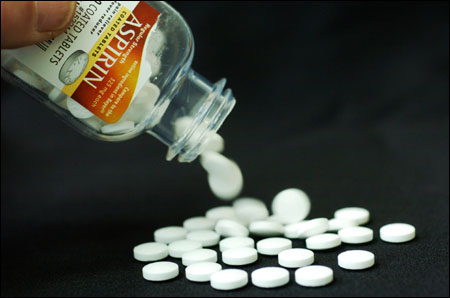Aspirin for Women: Yes or No?
By d00d00
@d00d00 (826)
Hong Kong
July 6, 2007 12:52pm CST
Study Renews Controversy, Shows Fewer Deaths in Women on Aspirin
March 26, 2007 – Last year, researchers told women that regular aspirin won't prevent heart disease or cancer. Now a new study says it does -- for some women, at least.
The new findings come from the Nurses' Health Study, a 30-year-long study of nearly 80,000 women. The study suggests that women who regularly take low-dose aspirin (81 milligrams of baby aspirin) or moderate-dose aspirin (325 milligrams of adult aspirin) are less likely to die than those who don't take aspirin.
The study shows that women who took low- or moderate-dose aspirin were:
25% less likely to die of any cause
38% less likely to die of heart disease or stroke
28% less likely to die of colon cancer
Women who regularly took high-dose aspirin -- more than 14 adult-strength tablets a week -- did not get a health benefit. Instead, they were 43% more likely to die from hemorrhagic stroke compared with those who never took aspirin. Hemorrhagic stroke is stroke due to bleeding in the brain.
Women got a heart benefit from aspirin after about five years of use. The cancer benefit didn't appear before 10 years of regular aspirin use.
Older women and women with pre-existing risk factors for heart disease got the largest benefit from regular low- or moderate-dose aspirin.
Andrew T. Chan, MD, MPH, assistant professor of medicine at Harvard Medical School, and colleagues report the findings in the March 26 issue of Archives of Internal Medicine.
"There are suggestions here that there is a subgroup of women for whom regular aspirin makes sense," Chan tells WebMD. "But no one should take aspirin therapy on her own. This still requires a thorough discussion of individual risks and benefits with a doctor."
No Aspirin for Women
The evidence remains strong that daily low-dose aspirin cuts a man's risk of heart disease and stroke -- although the drug does increase a man's risk of ulcers and gastrointestinal bleeding.
But the new study by Chan and colleagues isn't as convincing as last year's report from the huge Women's Health Study, suggests an editorial accompanying the Chan report.
Why? Editorialist John A. Baron, MD, of Dartmouth Medical School, notes that while the Chan study enrolled a large number of women for a very long time, it is what researchers call an observational study. That means the study researchers didn't make any changes to what the women were doing. They just kept track of what happened to them over time.
But the Women's Health study was a clinical trial that actually looked at what happens to women given regular aspirin compared with women not given aspirin. The results of this trial agree with most other clinical trials of aspirin for women.
"These new findings by Chan et al. cannot overcome the accumulated evidence that aspirin is not particularly effective for the primary prevention of death from cardiovascular disease in women," Baron and colleagues note.
That's also the opinion of Lori Mosca, MD, PhD, MPH, director of preventive cardiology at New York-Presbyterian Hospital and director of the Columbia Center for Heart Disease Prevention.
"I agree with the editorial," Mosca says in a statement. "This is the infamous Nurse's Health Study that led us down the wrong path for many things like hormone replacement therapy and antioxidants because it is observational and can't control for bias. The Women's Health Study was long-term and randomized, so recommendations should be based on that."
Chan, too, agrees that women should not start taking aspirin willy-nilly. But he says the study data raise important questions.
"Our study suggests there are common mechanisms between cardiovascular disease and cancer, and that this seems to be influenced by aspirin," he says. "We hope this stirs more research into these common mechanisms so we can develop drugs with all these benefits but fewer of the downsides of aspirin."
taken from: http://www.webmd.com/heart-disease/news/20070326/aspirin-for-women-yes-or-no
3 responses
@ladysurvivor (4746)
• Malaysia
10 Jul 07
I seldom take aspirins. I only take it if I get a headache, which I seldom get. I also take them when I have a little fever and do not want to go see a doctor. I only take normal dose aspirins, and they work on me very well. Just two days before I thought I was going to be very sick, so I swallowed an aspirin after dinner, another one after breakfast the following day and another one after lunch. After that I felt much better and the fever didn't appear. I am as healthy as new today. Thanks to aspirin. And yes, I don't forget drinking a lot of water.
@bdugas (3577)
• United States
3 Aug 08
I had a massive heart attack at the age of 51 and that was 1998, they said I probably wouldn't last another year and if lucky 5 at the most, I was told to take a 500mg aspirin every day, and that is what I have done since I got out of the hospital after open heart surgery, now I don't know about studies, all I know is after 10 years on September 3td this year, it will be 10 years that I have survived and I think it is because of the aspirin that has kept me alive, that and God, I have to buy coated ones as they do a job on my stomach. I think all women even at the age of 30 should start on a low dose of aspirin every day. Heart attacks don't know a age limit and if we can cut the risks then we should do it.








